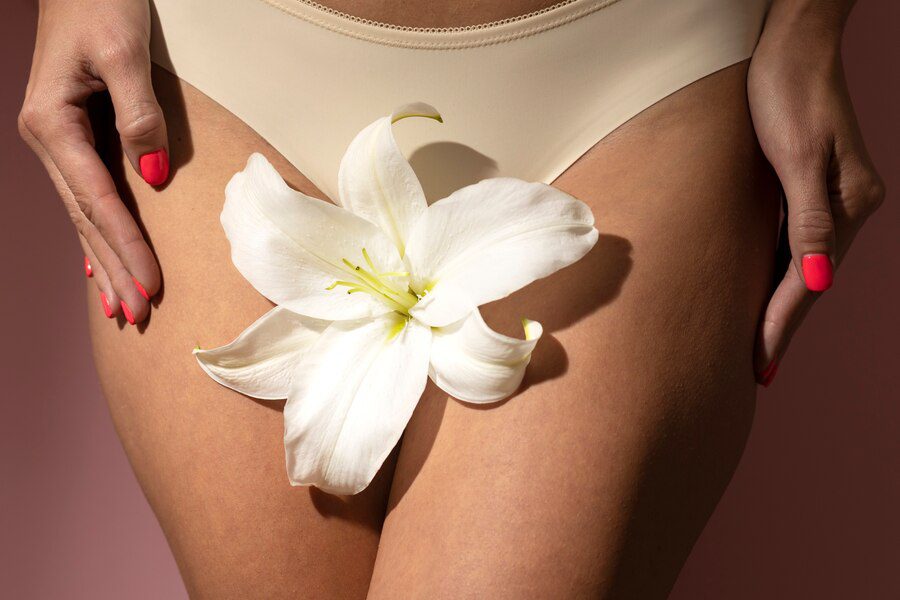This content is for informational and educational purposes only. Always consult a qualified healthcare provider.
Last Updated on April 8, 2024 by Grace Oluchi
The latest information on treating vaginal itching


Vaginal itching is a common concern that many people experience at some point. It can be caused by various factors such as yeast infections, bacterial vaginosis, skin irritants, or even stress. To address vaginal itching is to know what is causing it.
📋 Table of Contents
What causes vaginal itching?
Here are common causes of vaginal itching:
Irritants
You know those everyday products you use? They can cause your vagina to itch seriously. These chemical irritants can cause intense itching, we’re talking about dyes, alcohol, fragrances, etc.
If the leading cause of the itching is an irritant, your vulva and vagina might be red, sore, and itchy.
Products that often contain such irritants include:
- Soaps, shower gels, and bubble baths
- detergents
- scented feminine hygiene products
- douches
- fabric softeners
- harsh toilet paper
- creams, lotions, and ointments
- scented tampons, pads, and liners
- condoms with spermicidal lubricants
Yeast infection
Yeast is a naturally occurring fungus that is normally present in the vagina. It usually doesn’t cause any problems. However, when there is an overgrowth, it can lead to yeast infection, causing symptoms like itching and discomfort.
Therefore, if you’re experiencing itching, burning, and thick white discharge, you may be suffering from yeast infection.
Read Everything About Yeast Infection here
Skin conditions
Skin conditions can sometimes cause vaginal itching by irritating the sensitive skin in that area. Some common skin conditions that can cause vaginal itching include eczema, psoriasis, contact dermatitis, and lichen sclerosis. At times, outbreaks of these symptoms can occur on the vulva and cause it to itch.
Bacterial vaginosis
BV, also known as Bacterial vaginosis, is another potential culprit of vaginal itching. Similar to a yeast infection, BV is caused by the disruption of the natural balance of bacteria in the vagina, leading to irritation and discomfort. The condition doesn’t necessarily cause symptoms, however when symptoms do appear you get unusual discharge, a fishy odor, itching, and burning.
Menopause
Menopause can cause vaginal itching due to hormonal changes that lead to a drop in estrogen levels. This decrease in estrogen levels can result in the thinning of the vaginal walls, and reduce lubrication, leading to dryness and irritation, which can cause itching. You might also find sex painful and bleed after sex.
Stress
Did you know that physical and emotional stress can cause vaginal itching?
Stress weakens your immune system, leaving you prone to infections that cause itching. So, therefore, you might want to tone it down, if you’ve been stressing yourself out.
STIs
There are some sexually transmitted infections (STIs) that can cause your vagina to itch seriously:
- genital herpes
- chlamydia
- gonorrhea
- trichomoniasis
- genital warts
- These STIs can also cause the following symptoms:
- painful urination
- unusual vaginal discharge
- genital sores
- Vulvar cancer
Vaginal itching may be a symptom of vulvar cancer, however, vulvar cancer is rare. According to the American Cancer Society, women have a 1 in 333 chance of developing vulvar cancer. Hence, the itching of your vagina is a lot more likely to be caused by something else.
When to see your doctor about vaginal itching?
Many women wonder when it’s time to visit the doctor concerning their vaginal itching. It’s important to visit a healthcare provider if the itching is getting worse and starting to interfere with your daily life or sleep. Although most causes aren’t serious, a healthcare professional can help find and treat the root of your itch. They can offer advice, or a prescription, to help relieve you of the itch.
Contact your healthcare provider if the following cases arise:
- vaginal itching persisting for more than a week
- trouble urinating
- ulcers or blisters on the vulva
- pain or tenderness in the vaginal area
- painful sexual intercourse
- unusual discharge
- a foul odor
Medical treatment for vaginal itching
The first to successfully treat vaginal itching is to find the underlying cause of the itching. The specific cause of treatment will depend on the reason behind the itching.
Vaginal yeast infection
Yeast infections are treated with antifungal medications. These come in various forms, including creams, ointments, or pills. They’re available by prescription or over-the-counter.
However, keep in mind that if you’ve never developed yeast infection, speak with a healthcare professional before using an OTC treatment.
STIs
Treatment will depend on the STI, STIs can be treated with antibiotics, antivirals, or antiparasitic. Along with taking medication as prescribed by the doctor, it’s also advisable to avoid sex until the infection clears.
Menopause
Itching related to menopause may be treated with estrogen cream, tablets, or a vaginal ring insertion.
BV
Bacterial vaginosis (BV) is usually treated with antibiotics such as metronidazole or clindamycin. You may be given pills to take orally or creams you insert into your vagina. Regardless of the treatment option you get, be sure to finish the entire course of antibiotics even if your symptoms improve. Do not seize to take them halfway or miss a dose, it can be detrimental to your health.
What about the other causes?
Well, other types of vaginal itching and irritation tend to clear on their own. Meanwhile, apply steroid creams or lotions to reduce burning and provide relief. Also, if you want to avoid making things worse, use steroid creams exactly as directed, stop using them, and seek professional help if your symptoms worsen.
How to prevent vaginal itching?
Follow these tips
1 . Practice good hygiene by gently washing the vaginal area with mild soap and water.
2. Wear breathable cotton underwear and avoid tight-fitting clothing.
3. Avoid using scented products in the area of your vagina.
4. Stay hydrated and maintain a balanced diet to improve your overall vaginal health.
5. Practice safe sex to prevent
6. Manage stress levels, because stress can impact the health of your vagina as mentioned earlier on.
7 . Get tested for STIs and encourage your partner to do the same.
8 . Change out of wet clothing right after swimming or exercising.
9 . Start practicing the wipe front-to-back to keep bacteria from feces, away from the vulva and vagina.
What’s much cooler is that these tips are also great for managing vaginal itching, if you’re experiencing it.
If you experience persistent itching or other concerning symptoms, see a healthcare professional immediately.
Can certain foods help with vaginal health?
Yes, certain foods can promote vaginal health. Foods rich in probiotics, like yogurt and kefir, can help maintain a healthy balance of bacteria in the vagina. Additionally, foods high in antioxidants, such as berries and leafy greens, can support overall vaginal health.
Drinking plenty of water and consuming foods with omega-3 fatty acids, like salmon and flaxseeds, can also benefit vaginal health. Including these foods in your diet can contribute to a healthy vagina.
What are some natural remedies for vaginal itching?
Aside from medical help, you can practice some things to help relieve vaginal itching.
These 3 natural remedies can play a huge role in relieving you:
1 . Applying plain, unsweetened yogurt to the affected area
2 . Using a warm (not hot) bath with added colloidal oatmeal
3 . Apply a cold compress on the area to reduce itching and inflammation.
These remedies can help soothe vaginal itching without you having to use harsh chemicals.
How often should I use these remedies?
You can use these natural remedies for vaginal itching as often as needed or till you feel relief. Just make sure to listen to your body and adjust as necessary. If the itching persists or worsens, it’s always a good idea to consult with a healthcare professional.
Should I avoid any foods or activities to help with vaginal itching?
To help with vaginal itching, you might want to avoid certain foods like spicy dishes.
Other types of foods that can worsen itching are those high in sugar, as they can potentially contribute to yeast overgrowth, which may lead to increased itching in the vaginal area.
Also, wearing tight clothing or performing vigorous tasks could irritate the area due to sweating.
Being mindful of these factors can reduce the itching and help you feel better.

